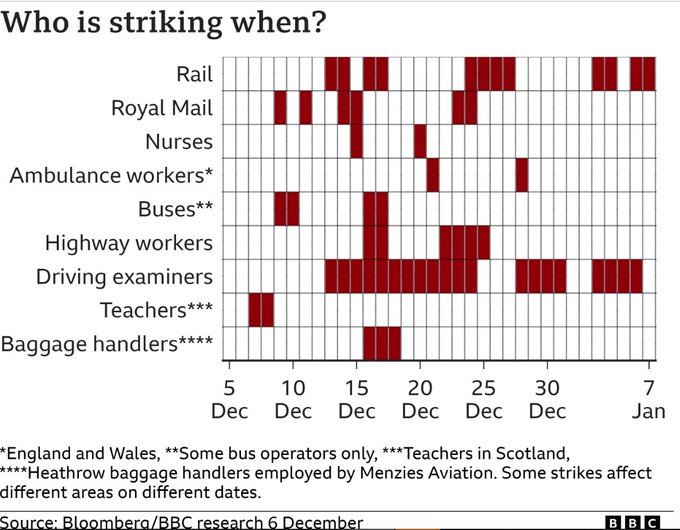With industrial action from one sector or another pencilled in for every day right up until Christmas, the PM is likely to press ahead with the introduction of tough new anti-strike laws. From rail workers to teachers and right through to a medley of NHS worker groups, it seems everyone is going on strike. Rishi Sunak told MPs that his government is continuing to work on “tough new laws” in an effort to minimise disruption to the public.
The proposed bill has already been presented to Parliament and is now set to be debated among MPs and peers. It would see the introduction of minimum service level requirements which would impede rail worker strike action. The possible outlawing of industrial action by emergency workers is also up for discussion. When pressed on this issue by a BBC reporter, Sunak said that the government would strive to be “reasonable” in negotiations. However, he stopped short of ruling out a potential ban:
“My priority is making sure that I keep people safe, and that I minimise the disruption in their lives, and I will do what is required to do that.”
Speaking to MPs, Transport Secretary Mark Harper said that the new anti-strike laws “may well improve the service passengers receive on strike days” in the future, admitting it would not “help with the industrial action that we face today”.
According to Downing Street sources, the government is also looking at other ways to curb strike action.
In a heated exchange between Sunak and Starmer during PMQs, the Labour leader called on the government to “stop grandstanding, stop sitting on his hands, get round the table and resolve these issues”. The PM hit back by accusing his opponent of failing to support businesses and workers impacted by industrial action.
Labour has vowed to oppose the minimum service level aspect of the new anti-strike laws, branding them “unworkable”. A Labour spokesperson said that the party would scrap the “archaic” 2016 Tory government industrial action legislation which banned online balloting and raised the thresholds required for industrial action to go ahead among public service workers.
Union leaders accuse the government of refusing to participate in meaningful negotiations
On Wednesday, the TUC and Unison urged the government to stop its “smoke and mirrors tactics” accusing it of “hiding behind” pay review committees. In a joint open letter to Chancellor Jeremy Hunt, Frances O’Grady, TUC general secretary and Christina McAnea, Unison general secretary and chair of the union public sector liaison group criticised the government for stonewalling meaningful pay negotiations.
“No public sector workers want to take strike action this winter. They are committed public servants who take great pride in their jobs and the communities they serve.
“But the government has left them with no choice.
“Good industrial relations require both parties to be willing to negotiate in good faith and to have open conversations.
“When your cabinet colleagues have met unions they have repeatedly refused to talk about public sector pay. Ignoring the main issue on the table isn’t a negotiation.
“Ministers cannot continue to hide behind pay review bodies. The government sets their remit.
“If ministers genuinely want to resolve these disputes, they must address what’s causing them.”
The letter goes on to highlight the plight of public sector workers:
“With CPI inflation over 11 per cent and RPI inflation above 14 per cent, frontline workers are facing another massive real termshit to their wages.
“Nurses, ambulance staff, teachers and millions of other key workers have already seen their living standards decimated with over a decade of pay cuts and wage freezes.
“Every month dedicated employees are quitting public services in droves – tired of being taken for granted and of services being run down.”
Concluding the letter, the two union leaders urged Jeremy Hunt to engage in meaningful pay talks:
“You say there is no money to fund decent pay rises. But this boils down to political choices.
“It’s time to raise taxes on wealth – not workers.
“Now is the not time for smoke and mirrors. Now is the time for genuine negotiations.
“Meet with unions as soon as possible – so our public servants can get on with doing the jobs they love and services can start to improve for everyone who relies upon them.”
Unions in ongoing legal action against new anti-strike laws
Back in September, the TUC and 11 other unions launched “a judicial review of ‘anti-worker’ regulations which ‘undermine the right to strike’. At the time, Frances O’Grady said:
“The right to strike is a fundamental British liberty, but the government is attacking it in broad daylight.”
The legal action followed strike rule changes introduce by Kwarteng’s business department. Speaking to The Independent, trade union law solicitor Richard Arthur said:
“The Conservative government should face up to its legal obligations under both domestic and international law, instead of forever trying to undermine the internationally recognised right to strike.”




